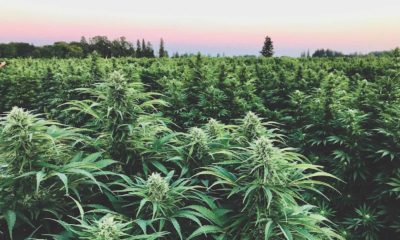Cultivation
How the Peace-Pipe May Be a New Way to Exploit Tribes
International sovereignty is more gray area than it is black and white and tribes growing cannabis is a prime example of how it clashes with U.S. drug laws.
Last fall, the Department of Justice (DOJ) issued a memo that sought to clarify 2013’s Cole Memorandum regarding the legality of growing cannabis on tribal lands. These memos did not give tribes the right to grow cannabis, they merely recognized in clear language that the tribes already had a sovereign right to grow cannabis on their land.
The Cole Memo sets out eight priorities that all cannabis growing and distribution is meant to adhere to in order to avoid federal interference. It also contains catch-all language that gives the DOJ carte blanche to infringe on state’s rights and international sovereignty if it serves “an important federal interest.”
Last year’s memo merely reiterated the main points of the Cole Memo, yet it managed to create mass confusion about the legality of native tribes growing and distributing cannabis. This confusion was so great that the DOJ released an FAQ which attempts to clarify what federal policy on tribal growing actually is — but still falls short as many questions remain for tribes, businesses and the broader communities they are part of. When the federal government first began talking about regulating the growing of cannabis on tribal and public lands, their focus was on illegal cannabis grows being conducted on sacred tribal grounds — not on tribes making money from the Green Rush.
In 2014, Northern California’s Karuk Tribe detained a man who was attempting to set up an illegal cannabis grow at their Ceremonial Dance grounds. When police arrived, they found over 600 plants being illegally grown on the property. Many tribes do hold cannabis to be a sacred herb, however the Karuk tribe does not. While the Karuk have not been particularly interested in last year’s memo, another Northern California tribe, the Pinoleville Pomo Nation (PPN), have jumped in head-first with a proposed $10 million indoor grow. This massive grow surprised county officials and law enforcement who learned about it through the press earlier this year, even though the deal has been in the works for some time.
Mendocino County District Attorney David Eyster and County Supervisor John McCowan have been two very outspoken critics of the PPN’s grow.
Eyster feels that “Marijuana is a state issue … and medicinal marijuana cannot be grown with an intent to make a profit.” He went on to say that, since it is a state issue, it doesn’t matter what the Federal government has to say on the matter, because they “they don’t tell me what to do.”
His statements do leave the door wide open to a grow that is legal under Prop 215 and SB420 and statements made by the Pomo within the same article indicate that may be what the tribe intends to do.
Supervisor McCowan shares similar views to the DA, saying that “this proposal flies squarely in the face of local law,” adding that “it’s hard for me to see how this would be consistent with state law.”
While the federal government cannot enforce federal policy on tribes, there is much ambiguity regarding the enforcement abilities of state and local police. This legal headache has put the PPN’s substantial cultivation operation on hold until this can be sorted out.
With billions to be made in the Green Rush, many companies are coming to the aid of tribes to help set up their grow operations — the main two leading the charge are FoxBarry Farms and United Cannabis Corporation. FoxBarry is most known for helping build casinos on tribal lands but they also help set up tribal farming operations, now to include cannabis. United Cannabis has several affiliates and is involved in numerous aspects of the medical cannabis industry, including research and growing. These two companies have entered into an exclusive contract and become the go-to consultants for the tribal cannabis industry.
Actor and cannabis activist Jae Benjamin commented about his involvement with a tribal grow operation that had been underway, until “lots of in fighting” chilled the deal and ultimately drove him away.
“I’ve pulled back from this deal because I had trepidations over it,” he admitted. “I watched the Indians get angry at developers, politicians, and I watched their fear made worse by no one answering their questions.”
Benjamin speculated why the Pomo grow seems to be at an impasse, “Natives don’t want to move forward out of fear of reprisals from government. There are so many mixed messages, it’s hard to tell what is really going on. The Feds can come down anywhere and clampdown whenever they want.”
Benjamin voiced real fears, such as the federal government using asset forfeiture or 280E to seize financial assets or even physical assets from tribes.
Due to the ambiguity and risks involved, says Benjamin, “Tribes will not start to grow with just a memo saying it is okay. They need something more substantial.”
A major drawback of massive indoor grows is that they use large quantities of electricity, which means that, unless a grow is solar-powered, it’s burning great amounts of coal and producing tons of greenhouse gases. Regrettably, growing indoors is a necessity in many places due to the government’s drug war policies. The PPN have a plan for how they can mitigate the environmental impacts of their grow. Michael Canales, the president of the PPN’s business board, has said that the money generated from cannabis sales will go to help reclaim tribal lands, most of which is in a flood zone. The PPN’s Environmental Department has been very active with numerous projects already and is likely to be even more active with an increase in funding. The PPN aren’t the only tribe involved in restoring their tribal lands, they are one of many tribes that are part of the Intertribal Sinkyone Wilderness Council, which aims to reclaim and protect a huge swath of forest in Northern California.
Along with the environmental downsides associated with large-scale indoor grows, an operation of this size has local mom-and-pop farmers worried that the PPN will put them out of business.
Julia Carrera, one of the founders of the Mendocino Small Farmers Association (SFA) said that, “It’s like Costco coming to town, the small mom-and-pop can no longer survive.”
The SFA supports small, family-owned, farms and helps them to obtain licenses to grow in hopes of preventing a corporate chokehold over cannabis farming. The SFA promotes organic and sustainable farming methods and works to further the spread of environmentally sensible growing practices.
Benjamin feels that fears of a corporate takeover by tribes are overblown due to the hesitance he sees on the part of tribes, “Mom and pops will survive, because indian tribes will be hesitant going forward.”
For now, smaller scale cannabis cultivation farms will continue to dominate in Mendocino county, without threat of a huge corporate situation opening up down the road at the PPN’s reservation. Unfortunately for the SFA and other small farmers, that $10 million grow is not going away— it’s merely a matter of time before the legality of tribal growing is clarified.
Do you think it’s safe for Native American Tribes to grow cannabis on their own land? Tell us your thoughts below.



























